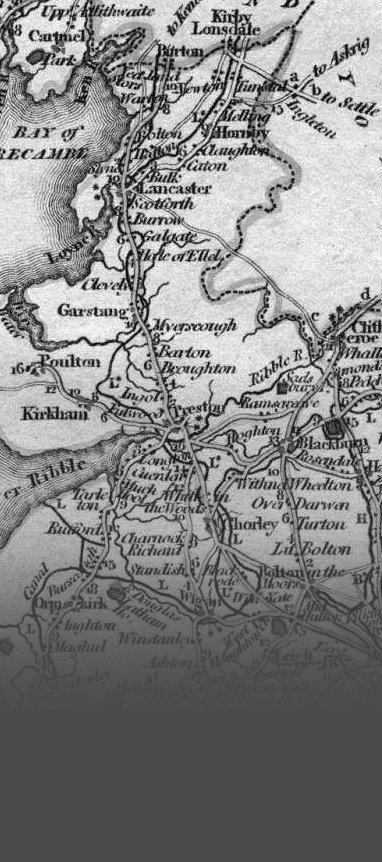

Blog
Reginald Brocklesby R.I.P. (1924-2024)
27th August 2024
We have recently been notified of the death of one of our long-standing members. Reginald Brocklesby led an extraordinary and inspirational long life and we thought members would be interested to read this tribute to his grandfather written by his grandson, Andrew.
Born in Yorkshire in 1924, Reginald started down the pit at the age of 14 working there till he was 40. During that time he taught himself - without a formal education - Latin, Middle English and Anglo Saxon. The ability to read original scripts served as his entrance to university at age 40, where Phillip Larkin once told him to be quiet in the library! After graduating he secured the post of Assistant Archivist and then Senior Archivist at the Nottinghamshire Archives Office working there until his retirement in 1989. Reg was an elected fellow of the Royal History Society and a subscriber to many learned societies.
A voracious and passionate student, reader, seeker of knowledge, over his lifetime he amassed a massive collection of books, journals and documents. Only a few weeks ago he took delivery of some new books and was even picking out future titles from a Bennett & Kerr catalogue! However, it truly broke his heart that over these last six months, his advanced age deprived him of reading for long periods, a combination of cataracts and age-related macular degeneration and diminished concentration. Since his birthday last year, Reg was already telling people with pride that he was in his 100th year! His long life was a full life, an amazing journey from mining to mediaeval polymath, well lived and enjoyed. In 1997 he authored volume 85 for the publication series of the Canterbury & York Society, The Register of William Melton, Archbishop of York, 1317-1340, IV.
In Thorne, where he lived from 1944, Reg was well known as a local “character” and often referred to as “Professor Brock”. He loved talking to people, curious about their background stories and offering explanations of their surname etymology. Many people will tell you of impromptu tutorials on manorial court rolls or Vermuyden’s engineering work in draining the marshland, when they had only nipped out to buy a newspaper! Over the years, his warm support, lively interest and many contributions and engagement in the activities and publications of his beloved Societies never dimmed or waned and brought much joy to him. Even down to the very last days of his life these Societies were a great motivator in his continuing interest in history. A new publication enlivened and energised him. He watched the post like a hawk anticipating the arrival of journals and annual publications. He was very keen to ensure that he did not miss any forthcoming publication; in some cases he had an unbroken series of Society volumes. He may well have been the only member, other than university and public libraries, with a complete run! One Society remembers him buying a copy of every single volume available and then had a monumental struggle to get the box to the Royal Mail to post it to him!
Reginald died on 17th July 2024, only four months short of receiving his 100th birthday message from the King! He always said work a third of your life, do good works a third of your life and holiday and do things you enjoy a third of your life. His passion was history and language.
Fascinating analysis of eighteen century army at Preston
26th May 2024
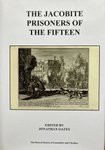 The Society’s latest volume sheds a fascinating light on the last battle to be fought on English soil. The Jacobite Prisoners of the Fifteen (Volume 159) provides detailed evidence about the people who fought unsuccessfully for James Stuart at the Battle of Preston in 1715. The main document that is described by Jonathan Oates lists 1,301 men who were taken prisoner and sent to gaols in Chester, Lancaster, Preston and Wigan. It gives their places of origin, their occupations and military details. Together with other sources, Oates uses the list to analyse the composition of the Jacobite army and what happened to the losers. A minority were executed – 49 out of a total of 1,877 known individuals; many were transported: 638 were “sold” into indented servitude in Carolina, Jamaica, Maryland, St Kitts and Barbados. Others escaped, died in prison or were even acquitted and released. The volume also reproduces the pleas of desperate prisoners. John Clavering was late applying for mercy because he had been ill with a “violent Fever” in prison, but eventually agreed that he had been “unfortunately engaged in the late unnatural Rebellion and is now a prisonser in Chester Gaol, but out of a deep sense & Detestation of his Crime throws himself at his Majesty’s Feet for mercy”. He was lucky enough to be released and discharged. This is a valuable volume for anyone interested in Britain’s military history, its justice system, the political machinations of the jacobite Rebellion or in Lancashire and Cheshire in the early eighteenth century.
The Society’s latest volume sheds a fascinating light on the last battle to be fought on English soil. The Jacobite Prisoners of the Fifteen (Volume 159) provides detailed evidence about the people who fought unsuccessfully for James Stuart at the Battle of Preston in 1715. The main document that is described by Jonathan Oates lists 1,301 men who were taken prisoner and sent to gaols in Chester, Lancaster, Preston and Wigan. It gives their places of origin, their occupations and military details. Together with other sources, Oates uses the list to analyse the composition of the Jacobite army and what happened to the losers. A minority were executed – 49 out of a total of 1,877 known individuals; many were transported: 638 were “sold” into indented servitude in Carolina, Jamaica, Maryland, St Kitts and Barbados. Others escaped, died in prison or were even acquitted and released. The volume also reproduces the pleas of desperate prisoners. John Clavering was late applying for mercy because he had been ill with a “violent Fever” in prison, but eventually agreed that he had been “unfortunately engaged in the late unnatural Rebellion and is now a prisonser in Chester Gaol, but out of a deep sense & Detestation of his Crime throws himself at his Majesty’s Feet for mercy”. He was lucky enough to be released and discharged. This is a valuable volume for anyone interested in Britain’s military history, its justice system, the political machinations of the jacobite Rebellion or in Lancashire and Cheshire in the early eighteenth century.
Remarkable detail of Tudor communities
7th July 2022
 When Henry VIII married his second wife while the first was still alive, he needed a mechanism for ensuring that his people would be loyal to him and his successors. The Succession Act of 1534 forced all grown men (from the age of 14 upwards) to swear a solemn oath “to beare faith truth and obedience” to the king and any children he would have by Anne Boleyn. All over England, hundreds of thousands of men had their names recorded and there must originally have been vast quantities of rolls, files and bundles of documents. But when Henry subsequently changed his mind, it seems they were deliberately destroyed as embarrassing evidence of his capricious policy changes – almost none have survived. In the Record Society’s Volume 158, Loyalty and Levy, which is published this month, Thomas Steel edits, introduces and sets into context the only known substantial remaining record, a roll listing 3,574 names from 15 parishes in the West Derby Hundred of southern Lancashire.
When Henry VIII married his second wife while the first was still alive, he needed a mechanism for ensuring that his people would be loyal to him and his successors. The Succession Act of 1534 forced all grown men (from the age of 14 upwards) to swear a solemn oath “to beare faith truth and obedience” to the king and any children he would have by Anne Boleyn. All over England, hundreds of thousands of men had their names recorded and there must originally have been vast quantities of rolls, files and bundles of documents. But when Henry subsequently changed his mind, it seems they were deliberately destroyed as embarrassing evidence of his capricious policy changes – almost none have survived. In the Record Society’s Volume 158, Loyalty and Levy, which is published this month, Thomas Steel edits, introduces and sets into context the only known substantial remaining record, a roll listing 3,574 names from 15 parishes in the West Derby Hundred of southern Lancashire.
Remarkably, the legislators had overlooked the detail of precisely what oath men were supposed to swear. So the text had to be retrospectively enacted in November 1534, more than six months after the people had been summoned by local leaders to gather in villages and towns to take the oath.
Given that the surviving document is ostensibly just a long list of names, Steel manages to draw from it a vast amount of information about the process by which the Lancashire commissioners undertook their task, how the oath was administered, the importance of the Earl of Derby and his household in the area, the knights, gentry, clergy and common population of the area. Among the men listed on the roll are the prior of Burscough, Robert Harvey, and his brethren, and 83 men sworn in Huyton (out of a total of 248 in the parish) who were explicitly listed as members of the Earl’s retinue.
Because the remarkable surviving roll of succession oath takers covers only about half of West Derby Hundred, the volume supplements the information with tax returns from a decade later, which include the whole area.
Taken together, Thomas Steel proves that these documents have much to say, in vivid and real detail, about the lives of our Tudor ancestors in Lancashire.
Brian Quintrell - a Tribute
24th May 2021
It is with great sadness that the Record Society reports the death in February this year of Dr Brian Quintrell.
Brian Quintrell served as the Society’s Honorary Treasurer for over thirty years, stepping down in 2000, and he remained a member of Council until recently. His doctoral studies at the University of Manchester were conducted at a time when close attention was being paid to local and regional history, in particular the nature of the relationship between the localities and the central administration. Appointed to the University of Liverpool in 1965, Brian was presented with an opportunity to contribute to the promotion of the region’s history as the Record Society was at that time in need of reinvigoration. Invited to serve as Treasurer, Brian’s diligent work resulted in the renewed flow of subscription income, enabling the production of larger volumes, accompanied by scholarly introductions.
Brian’s contribution to the work of the Society also included the publication of the Proceedings of the Lancashire Justices of the Peace at the Sheriff’s Table, 1578-1694 (1981) which drew attention to the unique nature of the meetings of the county’s JPs in Lancaster. He also contributed scholarly articles to the Transactions of the Historic Society of Lancashire and Cheshire on Lancashire’s relations with the Privy Council under Elizabeth I and the Early Stuart monarchs, and the career of John Bridgeman, Bishop of Chester. Brian’s research also investigated other aspects of early modern English government and resulted in important articles on Charles I’s Book of Orders and the king’s handling of the navy, and an edition of the Essex Deputy Lieutenant William Maynard’s papers. He brought his knowledge of the reign of Charles I to a wider audience through his Longman seminar study Charles I, 1625-1640.
Brian taught early modern history to over thirty cohorts of students at the University of Liverpool, focusing on the early seventeenth century for his final-year special subject. He talked to his students with the same shrewd insight and clear contextualisation when discussing the politics of the Stuart era or the ups and downs of his beloved Charlton Athletic FC. Brian’s research students benefited from his extensive knowledge of the sources, his conscientious supervision, and his expectation of high standards of accuracy and thoroughness, exemplified in his own work. This was conveyed with his unfailing good humour and neat typing – essential, as his handwriting proved challenging even to an experienced reader of seventeenth-century manuscripts. He generously continued supporting his students after they had completed their theses, guiding them in their published work, and advising those of us who went on to teach.
Brian Quintrell commanded the highest respect of all who knew him, and the Record Society expressed its gratitude to him by appointing him an Honorary Vice-President in 2018.
The Oldest Lancashire Ghost Story
22nd April 2021
The Record Society’s inaugural Colin Philips Memorial Lecture was given by Prof Paul Booth on 7 April when he explored The Oldest Lancashire Ghost Story. Based on a fascinating tale taken from a fourteenth century commonplace book, Paul Booth examined the details, the structure and the purpose of the story.
Dr Booth has published an English translation of the original Latin text, which is available here.
The story was written by a preacher, probably a friar, to be told to a congregation, almost certainly in Winwick church in the 1370s. An unmarried couple have sons before the man (a ploughman by occupation) marries someone else. The woman dies and one dark night, as the man is walking home, her ghost accosts him. As Prof Booth pointed out, darkness would have been very real at the time. The woman’s spirit invites her former lover to pull a tangle of her hair, which is thick and black (although it was gold-coloured in life). Once he has done this, she tells him that to release her from great suffering, he must arrange for as many masses to be said as there are strands of hair in his fist. The man shoves the hair into a hole in a doorpost, promptly sells half his worldy goods, and travels widely finding suitable priests, whom he pays to recite mass. Each time he is successful, a black hair in the bundle turns golden, and on a prearranged date, the man meets with the woman’s ghost again, to discover that his efforts have been successful, her hair is golden-coloured again and she is saved from the horrors she was enduring.
Prof Booth invited the audience to consider what the point of the story was. Would the congregation have believed literally in ghosts, why did the man have to travel so far to find “worthy” priests, and where was the woman coming from and going to? Perhaps the efforts were to ensure the priests were reliable and would actually deliver on their promises. The woman was perhaps stuck in purgatory and the events of the ghost story removed her to heaven.
But most of all, asked Paul Booth, would the friar have achieved his ends. Would the congregation have stuck any more firmly to what the church expected of them, would they have given more money for more masses? The people of the past, said Prof Booth, were “just like us, only in different circumstances”.
New volume opens the book on Liverpool library
18th December 2020
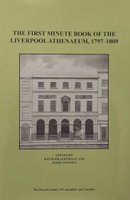
The Record Society’s latest volume sheds detailed light on the intellectual and commercial concerns that motivated eighteenth-century Britons. The first minute book of the Liverpool Athenaeum reveals the thoughts and motivations of the people who founded a voluntary subscription library, while pointing to the important of books, news, coffee and social space in daily life at the turn of the nineteenth century. From the first meeting on 27 November 1809, with Dr James Currie in the Chair until July 1809, when Thomas Martin chaired the meeting, the records uncover the relationships and concerns of the merchants, doctors, bankers and lawyers of Liverpool. Among the hundreds of books that are detailed in the minutes are “Stewart’s Letters to Mansfield on the Douglas Cause,” which we are told was a “cause celebre” in which the female heir to the title had twins “in dubious circumstances”!. The editors of the volume, David Brazendale and Mark Towsey, introduce the text with a fascinating insight into the founding of an ambitious and long lasting institution.
New volume shines headlights on motoring history
9th December 2019
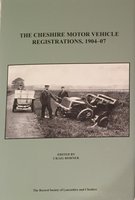 The Society's latest volume sheds light on the history of motoring in the northwest. The Cheshire Motor Vehicle Registrations, 1904-07, edited by Craig Horner, publishes one of the very few documentary sources available for the study of car ownership before the First World War.
The Society's latest volume sheds light on the history of motoring in the northwest. The Cheshire Motor Vehicle Registrations, 1904-07, edited by Craig Horner, publishes one of the very few documentary sources available for the study of car ownership before the First World War.
The very first car to be entered on the register in 1904, when registration became compulsory, was a dark green Darracq owned by Maurice Egerton of Rostherne Manor in Knutsford, who was described as an aviator in the 1911 Census.
In all, 167 makes of motorbike and 190 makes of car are identified in these records, and the owners include a doctor from Sale called Graham Renshaw, a woman called Isabella Laidlaw from Alderley Edge, and George Baxter, a butcher from Hoylake.
This will volume will fascinate anyone interested in motoring, anyone interested in the early twentieth century, and anyone interested in the social history, local history or genealogy of Cheshire.
Alan Harding - A Tribute
9th December 2019
The Society is very sorry to report the recent death of Professor Alan Harding. Professor Harding was President of the Record Society of Lancashire and Cheshire between 1981 and 1998: the second longest Presidential term in our 141-year history. During his years of distinguished service, he oversaw the publication of 15 RSLC volumes, covering topics from the middle ages to the twentieth century. The tribute below was written by Elizabeth Danbury, a former colleague of Professor Harding at the University of Liverpool.
Alan Harding (1932–2019), Professor of Medieval History, University of Liverpool, 1980–96.
Alan Harding was born in Guildford in Surrey, where he spent his childhood. He was the second youngest of seven children and the first in his family to go to grammar school. From Guildford Grammar School he was awarded a scholarship to University College, Oxford, one of the first generation of children from less privileged backgrounds to gain a place at Oxford.
He took a degree in Medieval and Modern History and followed his undergraduate course with a B. Litt., specialising in medieval legal history. He was employed in short-term posts at Manchester and London before being appointed to a junior lectureship at Edinburgh in 1961. Outside his academic life as an undergraduate and postgraduate student, he became a member of SCM (Student Christian Movement) and also developed a love of walking in mountain country including North Wales and North-West Scotland. Most important of all, he met his wife at Oxford. Dr Marjorie Harding (née Aitken) was – and is – a gifted crystallographer and an important pupil of Dorothy Hodgkin OM, a Nobel Prize-winner. Alan and Marjorie were married in 1958.
Alan stayed at Edinburgh University from 1961–80, being promoted first as Director of Studies, then Associate Dean and ultimately as Reader in the Department of Medieval History, while Marjorie had a post in the Chemistry Department. Their children Andrew and Kathey spent their early childhood in the family homes in Thirlestane Road and later in Tantallon Place.
In 1980 Alan moved to the University of Liverpool as Professor of Medieval History. The timing was, to say the least, difficult for the whole family. Both university and city were experiencing great problems during the early 1980s. The Toxteth riots took place in 1981, severely hampering travel between the Harding’s home and the University precinct; the University’s funding was much reduced, which seriously affected Marjorie’s prospects of work there; and the city council went bankrupt, which disrupted the schools. Alan’s colleagues in the History Department were almost astonished that the family did not turn tail and flee back to Scotland – no-one would have blamed them if they had!
But to do this would have been against Alan and Marjorie’s principles: both of them put work, colleagues and students first, and did not consider their own comfort and convenience. At Liverpool, as at Edinburgh, Alan took teaching and the support of students very seriously. No student with a worrying illness, or a family emergency at the other end of the country or a major work panic, ever sought his advice and assistance in vain. He listened patiently and carefully to issues raised and provided practical, positive and thoughtful help and solutions. He taught both on the undergraduate degrees and on the postgraduate degrees offered within the Department of History and was meticulous in marking and providing feedback. His attitude was that students and staff were all part of a family and that family members should be encouraged and supported – and nourished physically as well as mentally. Every one of the students taking the MA in Archive Administration during Alan’s time at Liverpool who were consulted during the preparation of this memorial commented on the annual party held in the Harding’s house in Woodlands Road. On these occasions, generations of archivists improved their ability to play croquet and table tennis and were royally fed and watered by Marjorie and Alan, ably supported by Andrew and Kathey.
As Head of Department, Alan had very little time for writing at Liverpool – hardly surprising, since Heads of Department in all British universities, both then and now, are overwhelmed with administrative duties. His publications on law and lawmakers in medieval England were largely published – or at least completed – either before he went to Liverpool or after he retired to Edinburgh. But he taught English political and administrative history to undergraduates and postgraduates and had strong views on the importance of teaching in the development of a student’s thought, expression and communication in its widest sense. He encouraged the highest of standards in academic research and teaching, fostered the introduction of computers into the History Department, did a great deal to support new MA degrees and promoted a variety of new developments in the MA in Archive Administration. As Head of Department, he sat on perhaps more than his fair share of University committees – and that at a time (1980s and 1990s) when the Higher Education budget was rapidly shrinking and forward planning was almost impossible. The damage to the budget of the University Library and the resulting loss of library posts, as well as the reduction in the ability to acquire new books or replace damaged or worn texts, was a source of great sadness to him, for he firmly believed in access to knowledge for students at all levels.
Outside the university Alan worked with colleagues in historical and other learned societies and associations, libraries, museums and archives in the North-West of England to encourage publication of historical material, discussion of archaeological and historical topics, professional development for heritage professionals and outreach to members of the public interested in family, regional, national or international history. He himself read widely and voraciously and acquired an impressive and well-used private library. In vacations, travel was important. The whole family journeyed widely within the UK and Europe – and much further afield, touring parts of the USA and China. Hill-walking remained a favoured leisure pursuit: Alan and Marjorie walked in the Cairngorms, the Highlands and the North-West of Scotland, as well as in Snowdonia. Another major interest was music. Although Alan never had the opportunity when young to learn to read music or to play a musical instrument, he grew to know and love classical music and concert-going, both in Liverpool and in Edinburgh.
However, Alan’s most important commitments were, from first to last, his family and the church. He kept in contact with his elder sisters in Guildford for all of their lives, visiting them whenever he could. His daily life focussed on his wife and children. Those who met him and Marjorie at home, both in Liverpool and after their retirement in Edinburgh, could be in no doubt about the closeness of their relationship. They were a wonderful team. Both were active members of St Columba’s church in the centre of Edinburgh. Alan served as churchwarden there between the mid-1960s and the early 1970s: he and Marjorie returned to worship at St Columba’s after his return to Edinburgh in 1997. He also undertook a great deal of outreach work, maintained ecumenical links with neighbouring churches, was a regular helper at ‘parish meals’ at Greyfriars church and, for many years, sorted books and organised the History section of the Christian Aid Book Sale in Edinburgh. An unshowy, self-contained man, he made no aggressive public display of his beliefs – but he acted on them. A thoughtful scholar and a Christian gentleman – to combine both attributes was an achievement of no small distinction.
Elizabeth Danbury, School of Advanced Study, University of London
(This informal tribute owes a great deal to Marjorie Harding’s notes on her husband’s life and to conversations and communications with former colleagues, students and friends. Particular thanks are due to Professor Christopher Allmand, Professor Judith Green, Dr Dorothy Clayton and Dr Jenny Kermode for their help and advice.)
Reviews reveal the importance and enjoyable nature of the Society's volumes
13th November 2019
Two recent book reviews emphasise both the historical importance and the entertainment value of the Society’s volumes. The Local Historian has reviewed Volume 155 – the cartographer William Lloyd Holden’s nineteenth century diaries – while Northern History appraised Volumes 148, 149 and 150 – the Crown Pleas of the Lancashire Eyre from 1292.
The review of Holden’s diaries stresses his impression of the towns and villages in Cheshire that he visited, and his off-duty activities, including telling ghost stories, shooting rats and playing cards. “It is impossible not to chuckle,” says the reviewer about Holden’s anecdotes and experiences – especially his discovery of bedbugs in his lodgings. “What Holden finds fascinating, the reader finds fascinating. There is much to enjoy in this volume”.
Reviewing the mediaeval eyre rolls, the attention to detail is praised – there is “meticulous consistency throughout” and “the depth, originality and comprehensive nature of the Introduction are of the highest quality. The description of the records is said to be “masterly,” the material on law enforcement “excellent” and the parts about the actual scene of the court in Lancaster Castle gives “a great atmospheric sense of the occasion”.
Both reviews demonstrate that the Society’s volumes have a wider value than their obvious and immediate significance to people who happen to be interested in the northwest of England. They expose material of broad historical importance, and genuine entertainment value, to an audience far greater than the beautiful, fascinating and precious original documents could ever achieve.
Colin Phillips
27th August 2019
It is with great sadness that the Society reports the recent death of our former President, Dr Colin Phillips.
Following over 25 years of generous service as a council member, Colin became President of the Society in 2013. He held office for five years, performing this role with a vigour and dedication that can have been equalled by few previous heads of the Society. During his time as President, Colin presided over and drove forward a number of important initiatives. These included new procedures for an Annual General Meeting for society members, featuring a public talk on some aspect of the history of Lancashire and/or Cheshire; the organisation of the Society’s archives, and collection of a master set of volumes; regular book launches to promote and celebrate its publications; the much-needed creation of a website for the Society; and the initiation of a major project for the digitisation of its past volumes, in order to make them freely and widely available to the public. Colin also oversaw the publication of eight new volumes during his five-year presidency.
Each of these initiatives owed a huge amount to Colin’s energy and ability to galvanise others. He was intimately involved in every aspect of the Society’s activities, supporting its officers (like him, all volunteers) in their tasks with encouragement and good humour. For the digitisation project alone, Colin devoted a great deal of time to investigating the different options for format, software and platforms, to enquiries relating to copyright and permissions, and to preparing volumes for digitisation. This was a mark of his passionate commitment to the Society and its aims, and his concern to ensure that it continued to thrive in the future. While preserving its rigorous scholarly standards, Colin’s legacy as President will be to have brought the Society into the digital age, and to have made its publications far more accessible to the general public.
Colin’s other major contribution to the Society was as the co-editor of volumes 124 and 131 of our publication series – editions of Stockport probate records from 1578 to 1660 – which were described by one reviewer as ‘the classic and standard work on how probate records can best be presented to the student’.
Astronomical importance on 300th Anniversary
10th June 2019
The 9 June 2019 is the 300th anniversary of the death of Henry Prescott, Deputy Registrar of Chester Diocese. Henry Prescott kept a diary from about 1680 until his death in 1719, although most of what survives of his diary covers the 15 year period from 1704. In it Henry details the people he met each day, the business he carried out in his work as a Deputy Registrar, where and how much alcohol he drank and which national and international news had arrived that day. The diary is a source of major historical importance and between 1987 and 1997 the Record Society of Lancashire & Cheshire published 3 volumes reproducing the diary along with analysis and commentary on its contents. As a keen amateur astronomer my particular interest in the diary stems from the fact that Henry recorded a number of astronomical observations after witnessing some spectacular celestial events in the sky. That aside it is impossible to read Henry’s diary without getting drawn into other interesting events and tales that he writes about!
I am very grateful to the Record Society for producing the modern reprint of Henry Prescott’s diary. This has enabled me to investigate Henry’s astronomical observations which include several major displays of the aurora borealis (the northern lights), a nearly total solar eclipse and a very bright fireball meteor that for half a minute turned night into day. Each of these is notable for various technical reasons and at the time they attracted nationwide attention and commentary. Henry was not an amateur astronomer but was moved to record these events because they were spectacular sights. The modern reprint of his diary has also helped me identify some interesting connections Henry had with well known astronomers of the day. Henry’s boss, the Registrar of Chester Diocese, was Dr Walter Pope but Pope did not carry out the Registrar’s work but deputed his administration to Henry in return for a proportion of the income, a not uncommon practice for the time! In fact Walter Pope had succeeded Christopher Wren as Professor of Astronomy at Gresham College, London in June 1662.
Pope had been appointed to the Registrar’s post by his step brother John Wilkins when Wilkins was appointed Bishop of Chester in 1668. As well as being an Anglican Churchman Wilkins was an author, scientist, polymath and a founder member of the Royal Society. In 1638 Wilkins wrote a book titled “The Discovery of a World in the Moone” in which he discusses the idea of travelling to the Moon and speculates on the possibility of life existing there. Then in 1640 he published a second book titled “A Discourse Concerning a New Planet” in which he supports the idea of the Earth as being one of the planets in the Copernican system. So Henry Prescott worked for a senior management team comprising two distinguished figures with very significant astronomy credentials. Henry also had connections with another well known astronomer, Edmond Halley, of comet fame. For two years from the summer of 1696 Halley worked in Chester at the Mint located inside Chester Castle. Sadly only about 2 months worth of Henry’s diary survives from this 2 year period, but it does contain one entry where Henry records being in the coffee house one evening with Halley and another friend Robert Davies.
I am writing a paper on the astronomical observations and connections of Henry Prescott which I hope will be accepted for publication in the Journal of the British Astronomical Association. I am sure that I am not the first, nor will I be the last researcher to benefit from the publications of the Record Society.
Richard Sargent
Old Crocks and Dodgy Car Salesman: Interpreting Cheshire’s Vehicle Registrations, 1904-07
24th April 2019
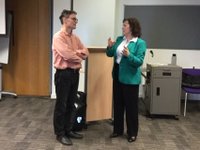 At the Society's AGM earlier this month, Dr Craig Horner of Manchester Metropolitan University delivered an engaging and insightful lecture on his recent research into the pre-WW1 Cheshire motor vehicle registration records, which he is currently preparing for publication for the Record Society. The Cheshire records – which are quite a rare survival – commence in 1904, after an act of Parliament required owners to register their vehicles, and shed much light on the social history of early motoring. Dr Horner discussed what this documentation can tell us about the relative popularity of different models of car and motorbike in North-West England in the years preceding the First World War; the sale, purchase and movement of second-hand vehicles; the social and occupational profile of early car owners; women’s involvement in early motoring; and the (mixed) reputation of motorists and chauffeurs. There were a wide range of questions from an appreciative audience, which were fielded with humour and expertise. The Record Society would like to thank Dr Horner for a fascinating lecture, and we await his forthcoming volume with much anticipation.
At the Society's AGM earlier this month, Dr Craig Horner of Manchester Metropolitan University delivered an engaging and insightful lecture on his recent research into the pre-WW1 Cheshire motor vehicle registration records, which he is currently preparing for publication for the Record Society. The Cheshire records – which are quite a rare survival – commence in 1904, after an act of Parliament required owners to register their vehicles, and shed much light on the social history of early motoring. Dr Horner discussed what this documentation can tell us about the relative popularity of different models of car and motorbike in North-West England in the years preceding the First World War; the sale, purchase and movement of second-hand vehicles; the social and occupational profile of early car owners; women’s involvement in early motoring; and the (mixed) reputation of motorists and chauffeurs. There were a wide range of questions from an appreciative audience, which were fielded with humour and expertise. The Record Society would like to thank Dr Horner for a fascinating lecture, and we await his forthcoming volume with much anticipation.
The Diaries of William Lloyd Holden, 1829 and 1830
15th January 2019
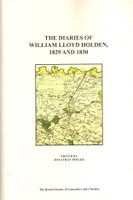 Volume 155 publishes the fascinating diary of William Lloyd Holden. In the history of cartography, William Lloyd Holden is not a familiar name; however, the chance survival of his diaries provides unique evidence of the actual processes involved in producing the county maps published by private surveyors and publishers in the period between the end of the Napoleonic Wars and the rise of the Ordnance Survey. Holden worked for William Andrewes Bryant in Cheshire – where he covered most of the northern part of the County from the Wirral to the Longdendale panhandle - and in the West Riding, particularly in the Holmfirth area and the Dales. He also spent the winter of 1829-30 in London, where he did odd pieces of work for Bryant as well as spending time with his family. The dairies show that the ‘actual’ surveys of Bryant, the Greenwoods and their contemporaries were primarily exercises in compilation and synthesis from existing large-scale local mapping, rather than new surveys. The diaries also provide a fascinating picture of the social life and activities, entertainments, flirtations and interests of an insatiably curious young bachelor, and incidentally of the communities in which he spent time.
Volume 155 publishes the fascinating diary of William Lloyd Holden. In the history of cartography, William Lloyd Holden is not a familiar name; however, the chance survival of his diaries provides unique evidence of the actual processes involved in producing the county maps published by private surveyors and publishers in the period between the end of the Napoleonic Wars and the rise of the Ordnance Survey. Holden worked for William Andrewes Bryant in Cheshire – where he covered most of the northern part of the County from the Wirral to the Longdendale panhandle - and in the West Riding, particularly in the Holmfirth area and the Dales. He also spent the winter of 1829-30 in London, where he did odd pieces of work for Bryant as well as spending time with his family. The dairies show that the ‘actual’ surveys of Bryant, the Greenwoods and their contemporaries were primarily exercises in compilation and synthesis from existing large-scale local mapping, rather than new surveys. The diaries also provide a fascinating picture of the social life and activities, entertainments, flirtations and interests of an insatiably curious young bachelor, and incidentally of the communities in which he spent time.
The siege of Nantwich 1643-4
30th May 2018
Residents of the Nantwich area, civil-war re-enactors, and many people interested in the history of the English civil wars of the mid seventeenth century will be familiar with the annual re-enactment of the battle of Nantwich held in that town at the end of January. Over the last weekend of that month members of the Sealed Knot gather in Nantwich, lay a wreath at the town war memorial in memory of the fallen, and re-enact the battle fought on 25 January 1644. A Royalist army led by Lord Byron from Chester had been besieging the town for six weeks but had to raise the siege to face an advancing Parliamentarian army from Manchester under the command of Sir Thomas Fairfax (later famous as the commander of the New Model Army and victor of the battle of Naseby). The two armies met at Acton, just to the west of the town. The Royalists were defeated and forced to abandon their siege; the Parliament remained in control of Nantwich for the remainder of the war.
By far the most detailed picture we have of the siege comes from the civil-war diaries of two Nantwich Parliamentarians, Thomas Malbon, a local lawyer, and Edward Burghall, vicar of the neighbouring parish of Acton. Both were published by the Society in 1889, edited by the Nantwich local historian Joseph Hall as Memorials of the Civil War in Cheshire and the Adjacent Counties (Vol. 19). Malbon provided a vivid eyewitness account of living through the desperate siege, from its beginnings as Royalist forces advanced towards the town in the week before Christmas 1643. He wrote of the infamous massacre at near-by Barthomley, where 12 locals were killed by the Royalists after they had been smoked out of the church and surrendered. He described conditions in the town, noting that since the men were guarding the town defences, it was left to the women to quench the fires started by the Royalist cannonade. He even kept a score of the number of cannonballs shot at the town (96 on one day, 16 January 1644).
A year after the battle Malbon recorded that the town commemorated the anniversary of its deliverance in ‘a solemn day of thanksgiving’. Those who mark the battle in modern times (a re-enactment has been held since 1972) are thus perpetuating a tradition (much interrupted) that can be traced back to 1645 and volume 19 of the Society’s publications.
Freemen of Chester
30th April 2018
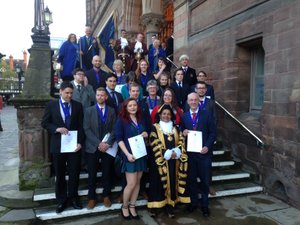 When the Lord Mayor of Chester, Councillor Razia Daniels, admitted 21 people to the Freedom of the City of Chester last week, she was following an ancient tradition. The rolls of Freemen up to 1805 have been published as Volumes 51 and 55 of the Society's publications. The earliest named people being made Free were from 1392, when John Tayte, Hugh de Prestcote and William de Laghok were admitted to the Freedom by the Mayor, Gilbert Trussell. Laghok was from Speke in Merseyside and Prestcote was a fletcher or arrow-maker. There is no record of what ceremony they enjoyed, but the current crop of Freemen swore that they would "be not assenting nor abetting to any confederacy nor conspiracy against the city nor my neighbours". The editor of Volume 51, which was published in 1906, believed: "This has probably been the form for a long time".
When the Lord Mayor of Chester, Councillor Razia Daniels, admitted 21 people to the Freedom of the City of Chester last week, she was following an ancient tradition. The rolls of Freemen up to 1805 have been published as Volumes 51 and 55 of the Society's publications. The earliest named people being made Free were from 1392, when John Tayte, Hugh de Prestcote and William de Laghok were admitted to the Freedom by the Mayor, Gilbert Trussell. Laghok was from Speke in Merseyside and Prestcote was a fletcher or arrow-maker. There is no record of what ceremony they enjoyed, but the current crop of Freemen swore that they would "be not assenting nor abetting to any confederacy nor conspiracy against the city nor my neighbours". The editor of Volume 51, which was published in 1906, believed: "This has probably been the form for a long time".
WILLS, FAMILIES, AND A CONFLICT IN STOCKPORT, 1606-1618
21st March 2018
The will making process is supposed to prepare the will maker and that testator’s family for the family’s passage from one generation to another. The biblical episode (II Kings 20, v1) of good King Hezekiah who fearing death put his house in order (made his will) and was then spared by the Lord, was an incentive, and a tale retold frequently in Stockport between 1620 and 1650 (see Volume 131), and widely in early-modern England in wills. As historians know to their cost, not everyone followed Hezekiah! And when they did, not every will was a success. Here is an example from the collection of Stockport probate records 1578-1619 which the Society published in 1984 (as volume 124, with me as a joint editor with the late J. H. Smith, to which page references are given).
When in June 1618 the wealthy widow Jane Robinson made her will she allowed her sister Margerie Hardman for Margerie’s life the right to sleep on a chaffe bed, “whereupon she usually lyeth”, and she gave her sister 20s which Jane’s executors were to pay her for her relief as they thought fit (p. 117).
When Margerie’s first husband, James Tellier (or Taylor) died in 1606 he was a man of modest substance, with land to lease and to work, some gold and silver pieces and money to lend, and a good stock in trade as a cutler. His estate was worth overall £122 (pp. 44-7). How was his widow reduced to begging a bed from her sister a dozen years later?
James left his estate to his wife and son James, and appointed his brother in law John Robinson as his executor, and John proved the will. If Margerie and James died, then the estate was to go to the children of John Robinson. Margerie remarried a Robert Hardman (or Haldman), and her new husband and his wife sued Robinson over his administration of the estate (p. 47). John Robinson died in 1617 and when he made his will he claimed that James Tellier’s estate was wasted in lawsuits brought by the Hardmans against him (p. 103). Is this litigation why, a year later, Margerie was camped out with her sister? Margerie was not described as a widow in 1618, and there was a Robert Hardman living in Stockport in 1619, so had her second husband thrown her out?
There is lots to follow up from this tale (perhaps already done by historians of these families), including some missing genealogy. Presumably John Robinson won his case in the church courts, so the Hardmans went to common law (p.117). John Robinson offered no clue as to which court: one of the Palatinate of Chester courts, or a national law court perhaps? What details might await the enquirer there?
The family is generally regarded by historians as a pillar of society, but here is a corrective to that generalisation, the breakdown of a relationship leading to costly and ultimately exhausting litigation.
C. B. Phillips
European relations - then and now
19th February 2018
Given the current debate about the country's relations with other parts of Europe, it is interesting to reflect on the participation of a couple of prominent Europeans in the civil war in the North West over 370 years ago. Some of the earliest items of correspondence published in R. N. Dore’s edition of the Letter Books of Sir William Brereton (volumes 123 and 128) reveal the impact of the arrival in Cheshire in February 1645 of the 24 year-old Maurice, prince palatine of the Rhine, son of Charles I’s sister, Elizabeth, and his elder and better-known brother, Rupert, the following month. Having already served in the Dutch and Swedish forces, Maurice had fought at Edgehill and in the West Country before setting up his command at Worcester early in 1645; he marched on Chester while the parliamentarian siege of the city was underway. On 8 February the Committee of Both Kingdoms informed Brereton, commander-in-chief of parliament’s forces in Cheshire, that it was diverting forces from surrounding counties to try to prevent Maurice from reaching Chester. The failure of those forces to arrive in sufficient numbers led to Brereton’s response a fortnight later that the prince had entered the city, frustrating – temporarily – his efforts to blockade it completely.
The following month, Brereton was warned of Rupert’s march towards Chester, bringing with him additional forces: in the words of one of Sir William’s supporters, ‘The Prince draws nigh and our armies lie yet in a chaos’.
Brereton’s letters provide a fascinating insight into his efforts to monitor, and respond to, the princes’ activities in Cheshire. They also reveal the importance he placed on the timely appearance in the county of Scottish forces, convinced that this was essential to prevent the king's nephews from heading north to recruit troops in Lancashire and endanger parliamentarian control of much of the north of England. By the end of March, however, Brereton could report the sudden departure of Maurice and Rupert and their removal of some of the garrison, and what he understood to be the ‘desperate and forlorn condition’ of the city.
The intervention of the palatine princes – a source of great concern to the parliamentarian command in Cheshire in February and March 1645 – had ultimately weakened royalist control of both the city and the county.
Oldest material in the Society's volumes
29th January 2018
Most of the Society’s publications publish texts recording events ranging from the later middle ages to the twentieth century, but Volume 14 includes historical events from much earlier. Called the Annales Cestriensis - Annals of Chester - the document it transcribes and translates was probably written in the late fifteenth century, but it was copying out entries from an older chronicle. The editor, Richard Copley Christie, went to great trouble to try and work out what he could about that old book, and came to the conclusion it was probably kept at Chester Abbey and was possibly a book that was destroyed by a fire in the 1730s.
Much of what the document records is well-known from other sources – it starts with the birth of Jesus and ends with a journey by Edward I in 1297. But some of its material is unique, especially in relation to local characters – it appears to be the only known source for the date of birth of Hugh Cyfeiliog, who was Earl of Chester in the late twelfth century and who, according the Annales Cestriensis, was born in 1147. And because information is very scarce about Cheshire in the period between the Romans leaving Britain in 410 and the Normans arriving in 1066, anything the manuscript call tell us for those centuries is valuable. It describes the founding of St John’s Church in Chester as long ago as the year 689 and the moving of St Werburgh’s remains from Staffordshire to Chester in 875.
Many English chronicles have unpleasant things to say about the Vikings, whose raids began at the very end of the eighth century. The Chester Annals have an interesting way of expressing their impact. Under the year 789, they record “The first arrival in England of the Danes, who taught the English to drink too much”.
Review of Volumes 148-150
11th January 2018
The following review recent appeared in the newsletter of Lancaster University's Regional Heritage Centre:
NEW LIGHT ON LIFE IN MEDIEVAL LANCASHIRE
One night, at a date somewhere between 1272 and 1292, Richard the lorimer (i.e. maker of metalwork for horse bridles) of Lancaster discovered his wife and her lover ‘sitting and dallying’ in a malt-kiln near the town – a warm and secluded place for a lovers’ tryst. A fight ensued and each man wounded the other fatally. The case came before the justices at the Lancashire eyre in 1292. Even though both men were dead, the Crown expected to exact a financial penalty for homicide from their assets, and Richard the lorimer had been a comparatively wealthy man, possessing chattels and a burgage property in Lancaster, from which the sheriff was answerable for sums totalling over 60 shillings.
Such detailed cameos of the lives of ordinary folk in thirteenth-century Lancashire are provided by a rich new publication, a full scholarly edition of the Crown pleas before justices at the Lancashire eyre of 1292, prepared by Margaret Lynch with members of the Ranulf Higden Society and published by the Record Society of Lancashire & Cheshire. The eyre swept up cases of crime (killings, theft, rape), sudden death (suicide and death by misadventure), misconduct of local peace-keepers, and threats to the Crown interest which had occurred in the twenty years since the previous eyre in 1272. The text is at one level a sombre account of death and malpractice but it is the incidental details of everyday life that make it such a vivid window into medieval times. This is a high quality edition, with the Latin of the original on left-hand side of each page, opposite an English translation on the right. It is fully indexed by Carrie Smith and comes with a pithy, scholarly introduction by Henry Summerson. All are to be congratulated on making this rich source accessible to all who are interested in Lancashire’s past.
New volume sheds light on 18th century life and industry
21st July 2017
James Buckley's cash book from 1729 to 1733 has been published as Volume 154 of the Society's texts. Buckley was a land agent and surveyor and a trustee of Cranage Forge near Knutsford and the records which are published are his detailed accounts of all the money he received and expended throughout the four years. They include matters concerning the business of the forge and also Buckley's private affairs and those of his associates and family. The cash book sheds light on the development of the iron industry in the area, and also on the everyday lives of the local population Edited by Jim Sutton, the volume gives a fascinating look at the lives of an upwardly mobile man of business and his circle.
The volume will be of particular interest to people interested in he following families, whose names are mentioned repeatedly in the cash book: Askham, Booth, Cotton, Hall, Kenerley, Leadbeater, Okell and Vawdry.
Launch of Volume 152
13th March 2017
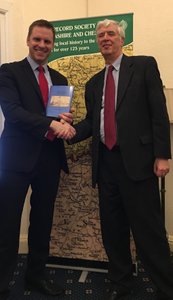 Members and friends of the Record Society met last month in Liverpool to launch volume 152, The Letters of William Blundell the Cavalier, edited by Geoff Baker with Nick Martin-Smith. Dr Baker holds a visiting fellowship at Liverpool Hope University where he began his historical studies; the University was delighted to welcome him back to celebrate the publication of his volume.
Members and friends of the Record Society met last month in Liverpool to launch volume 152, The Letters of William Blundell the Cavalier, edited by Geoff Baker with Nick Martin-Smith. Dr Baker holds a visiting fellowship at Liverpool Hope University where he began his historical studies; the University was delighted to welcome him back to celebrate the publication of his volume.
Mr Mark Blundell, representing the Blundell family, opened proceedings with some fascinating observations about the remarkable life of his seventeenth-century predecessor who managed to travel widely at home and abroad while living under the supposed restraints of the penal laws. Dr Baker responded by explaining how his interest in the career of William Blundell developed following a thought-provoking lecture on the ‘Popish Plot’ during his undergraduate studies and the advice he later received to focus his doctoral work on the later seventeenth-century Catholic community. Dr Baker also drew attention to the large body of William Blundell’s correspondence and other papers still awaiting a modern critical edition.
The Record Society’s President, Dr Colin Phillips, drew attention to the connections between volume 152 and the Society’s other titles focusing on Lancashire and recusant history, and the importance of early modern work in our back catalogue. He thanked the previous speakers, emphasising the importance to record societies of interesting historical evidence and willing volume editors. Before formally launching the volume, Dr Phillips also thanked the Record Society’s general editor, Dr Martin Heale, for his work in overseeing recent publications.
Those present were invited to visit the university’s Special Collections to see some of the books on deposit from the Archdiocese of Liverpool’s Gradwell Collection and the Diocese of Lancaster’s recently-deposited Talbot Collection. Thanks are due to Liverpool Hope University for the refreshments and warm welcome and to Karen Backhouse for inviting us to visit the Special Collections.
The photograph shows Mr Mark Blundell (right) of Crosby Hall congratulating the volume editor, Dr Geoff Baker.
Launch of the Letters of William Blundell the Cavalier
8th January 2017
The Record Society and Liverpool Hope University jointly extend a warm welcome to members to an event to launch Volume 152 of the Record Society's publications, from 5pm to 7pm on 15 February 2017. The event will be held in the Senior Common Room in the Hilda Constance Allen building of Liverpool Hope University, L169JD.
The Letter of William Blundell the Cavalier, edited by Geoff Baker with Nick Martin-Smith is a fascinating collection of letters relting to a Catholic gentleman, covering the second half of the seventeenth century. It details the ways in which Blundell survived the Civil Wars and how he navigated the penal laws and developed Catholic connections throughout England and continental Europe. Dr Geoff Baker, who edited the volume, is Principal of Cromer Academy and holds visiting fellowships at both the University of East Anglia and Liverpool Hope University.
Refreshments will be served, and in addition to celebrating the volume, there will be an opportunity to tour the Sheppard-Worlock Library's Special Collections vault to see the Archdiocese of Liverpool's Gradwell Collection and the Diocese of Lancaster's recently-deposited Talbot Collection.
RSVP to Dr Fiona Pogson at pogsonf@hope.ac.ukor 0151 291 3115
New way of accessing Star Chamber records for the two counties
19th December 2016
A new project created a finding aid to some of the most difficult to use Elizabeth records relating to Lancashire and Cheshire. The Elizabethan Star Chamber Project, hosted by AALT at the University of Houston, is putting county names to cases in the National Archives class to Records of the Court of Star Chamber (Class STAC5). You can access the new lists and indexes here.
The suits in this series include cases alleging perversion of justice, abuse of legal procedure, frivolous litigation, false imprisonment, or crimes unpunished, often because of corruption. Such cases might involve corrupt jury verdicts, perjury, improper procedure, and falsification of records either by officials of the court or by the interested parties, including forgery of bonds, wills, and deeds. Other criminal causes included allegations of murder, abduction, assault, and riot
There is now a sufficient number of cases identified to make the website interesting to local historians, and there is a large number of suits from Lancashire and Cheshire. All of the original documents are in English, but most of the cases are completely unknown to historians, largely because of the impenetrable way the records were originally filed, and then catalogued at the National Archives (cases may have up to twenty different references). This is the first time most of them have had a usable finding aid.
Some of the cases in STAC5 relate directly to material found in Record Society Volumes. For example, the Cheshire case of Sir Robert Remington and Elinor his wife versus Thomas Starkey and others is clearly about the same issue as the Exchequer Deposition relating to the same parties, which is calendared in Volume 11 from 1885. This gives details of the Remingtons’ dispute with Starkey and his associates, relating to lands in Frodsham.
Exciting new 20th Century Volume
26th October 2016
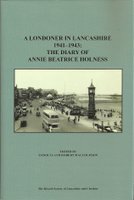 Volume 153 - A Londoner in Lancashire - is an exciting new volume from the Society that reproduces major selections of a the wartime diary of Annie Beatrice Holness, who was evacuated from Barnet in North London to Morecambe in Lancashire. Annie Holness was a middle-aged civil servant who began a diary for Mass Observation, a social research project that had begun in 1937. Her thoughtful and observant diary records everyday life in all its detailed diversity - her billet, her enjoyable country walks, her sometimes dreary job, her usually gratifying leisure activities (night classes, music, theatre, her allotment), the congestion and the sights and sounds of wartime Lancashire. She often lamented feeling like an 'exile' in Morecambe and returned to London after the war ended, but she could not stay away and two years later came back to settle permanently in Lancashire. This volume will be fascinating to many people interested not just in Lancashire history but in the reality of life in wartime Britain.
Volume 153 - A Londoner in Lancashire - is an exciting new volume from the Society that reproduces major selections of a the wartime diary of Annie Beatrice Holness, who was evacuated from Barnet in North London to Morecambe in Lancashire. Annie Holness was a middle-aged civil servant who began a diary for Mass Observation, a social research project that had begun in 1937. Her thoughtful and observant diary records everyday life in all its detailed diversity - her billet, her enjoyable country walks, her sometimes dreary job, her usually gratifying leisure activities (night classes, music, theatre, her allotment), the congestion and the sights and sounds of wartime Lancashire. She often lamented feeling like an 'exile' in Morecambe and returned to London after the war ended, but she could not stay away and two years later came back to settle permanently in Lancashire. This volume will be fascinating to many people interested not just in Lancashire history but in the reality of life in wartime Britain.
Benjamin Shaw's family records
15th January 2016
In the best historical tradition, I came upon this document by chance while looking for something completely different. I knew immediately that it was of outstanding importance, and also of extraordinary interest – the uniquely detailed autobiography of a mill mechanic who lived during the turbulent and transformational period of the early phases of the industrial revolution, from 1772 to 1841. He not only describes his own life, but gives biographies of no fewer than thirty of his family, making this an account of an ordinary working class family which has no parallel in Britain. The text covers almost every aspect of working class life, from wages and working conditions, via courtship and marriage, serial illegitimacy and domestic discord, to sickness, infant mortality and early death. Its geographical scope is also wide: the author was born in Dentdale, the most remote of the Yorkshire Dales; he worked for some years at Dolphinholme near Lancaster, the first water-powered textile mill in England; and spent most of his adult life in the teeming, smoky industrial town of Preston. That journey is itself almost a metaphor for the lives of tens of thousands of migrants during this period, when the industrialisation of North West England was reshaping the world. Now recognised as one of the seminal published texts for late eighteenth and early nineteenth century working class life, Benjamin Shaw’s Family Records is for me, its editor, also an intensely moving and endlessly fascinating document. It was a pleasure and a privilege to be able to produce this edition.
Alan Crosby, Editor, Volume 130
New volume of Forest pleas
20th September 2015
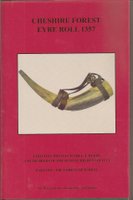 The latest volume from the Record Society shows what life was like for people living on the Wirrall in the fourteenth century. Subject to 'forest law,' which restricted their activities so as to preserve hunting rights for royalty, the area was perodically visited by judges to check that the inhabitants were not digging ditches that might trap the king's deer, enclosing land or taking wood or other commodities that they were not legally entitled to.
The latest volume from the Record Society shows what life was like for people living on the Wirrall in the fourteenth century. Subject to 'forest law,' which restricted their activities so as to preserve hunting rights for royalty, the area was perodically visited by judges to check that the inhabitants were not digging ditches that might trap the king's deer, enclosing land or taking wood or other commodities that they were not legally entitled to.
This is a fascinating insight into a system that has long since been forgotten but which was a very real presence in the late 1350s, when these records were created.
Two volumes of fascinating thirteenth century lives
28th July 2015
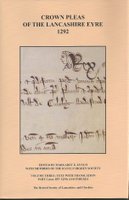
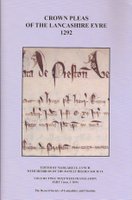 The two latest Record Society publications bring the total list of volumes to 150, and they give a wonderful insight into the lives of thirteenth century Lancaster. The Crown Pleas of the 1292 Eyre of Lancashire constitute a detailed record of crime and disorder, official misconduct, threats to the king's rights and much else that had happened during the previous two decades. Roger of Bare prosecuted William Haverhill of Staynall for assault. Mabel Smith wanted to prosecute Geoffrey Pleasington but he had died. Richard son of Henry had drowned and his father had found his body; as the first finder of a corpse, he was automatically suspected of foul play, but the two men who were supposed to have arrested him could not produce him, so it was they who were in trouble.
The two latest Record Society publications bring the total list of volumes to 150, and they give a wonderful insight into the lives of thirteenth century Lancaster. The Crown Pleas of the 1292 Eyre of Lancashire constitute a detailed record of crime and disorder, official misconduct, threats to the king's rights and much else that had happened during the previous two decades. Roger of Bare prosecuted William Haverhill of Staynall for assault. Mabel Smith wanted to prosecute Geoffrey Pleasington but he had died. Richard son of Henry had drowned and his father had found his body; as the first finder of a corpse, he was automatically suspected of foul play, but the two men who were supposed to have arrested him could not produce him, so it was they who were in trouble.
There are over 1000 entries in the volumes, with the original Latin text published side by side with an English translation. The work of Margaret Lynch and other members of the Ranulf Higden Society, these two volumes gives a remarkable picture of life over 700 years ago.
**BOOK LAUNCH FOR THREE RECORD SOCIETY VOLUMES**
17th April 2015
THE SHIRE HALL, LANCASTER CASTLE,
CASTLE HILL, LANCASTER, LA1 1YS
31 July 2015, at 6-30pm
Margaret E. Lynch. who has edited volumes 148, 149, and 150 of the Society’s publications, invites all members of the Record Society of Lancashire and Cheshire (RSLC) to a book launch of the 3 volume edition of Crown Pleas of the Lancashire Eyre, 1292, translated and transcribed with members of our Society and the Ranulf Higden Society. RSLC published the first volume of the trilogy as its volume 148, in December 2104. Volumes 2 and 3 of the trilogy will be RSLC vols 149 and 150, due out in the summer this year.
Speakers expected are:
Professor Paul Brand (University of Oxford)
Dr Alan Crosby
Dr Simon Harris (Chairman of The Ranulf Higden Society)
(all introduced by Dr Colin Phillips, President, RSLC).
Attendance is free, but for security reasons you must book in advance and only those who have booked will be admitted.
To book a place email to: margaretlynch@btinternet.com
Bookings will be taken on a first-come-first-served basis because numbers are limited. Bookings will be acknowledged, and rejections because of the numbers limit notified.
This is a major publication, and your support at Lancaster will be much appreciated. The Eyre was held in Lancaster Castle, an appropriate place, therefore, to launch this edition.
The RSLC membership secretary is Jim Sutton: jimsutton37@hotmail.co.uk
The Battle of Preston
25th March 2015
In a fascinating Special Lecture following the Society's AGM, Professor Dan Szechi told the story of the Battle of Preston in November 1715. The political context, the international dimension, novice Jacobite commander and the Government's strategy of keeping its best troops close to London all contributed to a situation in which two sets of soliders, neither of whom was especially well trained, fought a disorganised series of confrontations within the town of Preston.
When large numbers of Government troops were killed and retreated out of the town, everyone thought the Jacobites had won, but their commander Thomas Forster unexpectedly offered to surrender, seemingly horrified by the sight of dead and wounded men in the marketplace. The Jacobite cause in England was lost for good, and Lancashire acquired the distinction of hosting the last significant battle ever fought on English soil.
A fascinating story expertly told brought to life the people and events of the Northwest three hundred years ago this year.
Cheshire Sacrament Certificates
13th March 2015
The Record Society of Lancashire and Cheshire has mounted hundreds of names of ancestors from the North West online to mark the 300th anniversary of the Battle of Preston. Local and family historians will be able to search for ancestors who were forced to prove they were not Roman Catholics, after the Catholic supporters of Bonnie Prince Charlie were crushed by the government army at Preston in 1715. More details are here
At a public lecture in Liverpool on Weds 25th March, Prof Daniel Szechi of Manchester University will ask why the Jacobites failed to recover after their defeat at the Battle of Preston in 1715, often described as the last full scale battle fought on English soil. At the same time, the Society is publishing the first tranche of 1,000 names taken (by Dr Peter Cotgreave) from documents called Sacrament Certificates, which were needed to prove that anyone in a position of authority – clergymen, tax collectors, mayors and so on – were practising members of the Church of England. The Certificates had to be signed by witnesses, so the names also include many more ordinary members of local parishes.
The President of the Society, Dr Collin Philips said: “For over 130 years, the Record Society has been making historical documents of the area available to professional and amateur historians and this year we will bring out our 150th printed volume. This new venture for the Society of publishing material online will allow us to expand the range of historical records that are readily available to genealogists, people interested in local history and professional history researchers. The Society is open to anyone interested in the history of Lancashire and Cheshire.”
Dan Szechi’s lecture Preston 1715 and the Failure of English Jacobitism will be at 2.15pm on Wednesday 25th March in the Department of History of the University of Liverpool, Abercromby Square, L69 7WZ. Admission is free. More details of the Society, the lecture are available here.
New volume of Lancashire eyre roll
18th December 2014
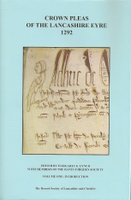 The Society's latest volume (Volume 148) is noe published, and discusses murders, bribery, theft and violence. The first of three volumes dealing with the Crown Pleas of the Lancashire Eyre of 1292 is a fascinating introduction by Henry Summerson. It places into context a whole range of legal cases that today would be called criminal actions and public order offences. Land and property, wealth and poverty, lords and criminals are all discussed, and placed into the fascinating context of a county far from the central government in London during the reign of Edward I. In 2015, two further volumes will publish the text of the rolls in the original Latin and in English translation. Volume 148 can be purchased by non members for £25. Details of how to buy copies of the Society's volumes can be found here.
The Society's latest volume (Volume 148) is noe published, and discusses murders, bribery, theft and violence. The first of three volumes dealing with the Crown Pleas of the Lancashire Eyre of 1292 is a fascinating introduction by Henry Summerson. It places into context a whole range of legal cases that today would be called criminal actions and public order offences. Land and property, wealth and poverty, lords and criminals are all discussed, and placed into the fascinating context of a county far from the central government in London during the reign of Edward I. In 2015, two further volumes will publish the text of the rolls in the original Latin and in English translation. Volume 148 can be purchased by non members for £25. Details of how to buy copies of the Society's volumes can be found here.
Peter McNiven
27th June 2014
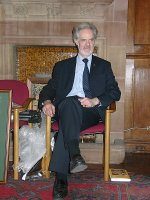 It is with great sadness that the Society records the death on 24 June 2014, at the age of 69, of Dr Peter McNiven, our general editor from 1984 to 1994 and from 2002 until 2012.
It is with great sadness that the Society records the death on 24 June 2014, at the age of 69, of Dr Peter McNiven, our general editor from 1984 to 1994 and from 2002 until 2012.
Peter was born in Doncaster, Yorkshire, on 22 September 1944. By 1947, when Peter’s sister Tina was born, the family was living in St Helens in Lancashire. Peter was educated at Prescot Grammar School and Manchester University. He gained a First in History in 1965, and was awarded an MA in 1967 for a thesis entitled, ‘Rebellion and Disaffection in the North of England, 1403-08’. His PhD, supervised by Professor John Roskell and awarded in 1977, was on ‘Political Development in the Second Half of the Reign of Henry IV, 1405-13’.
Peter joined the University of Manchester Library in 1969. Although he spent most of his career working in the University Library on Oxford Road (holding a number of posts, including History Cataloguer and Librarian, Guardian Archivist and University Archivist), he will be best remembered for his outstanding work as Head of Special Collections (1988–2000), based in the John Rylands Library, Deansgate. He played a pivotal role in revitalizing the department through the first John Rylands Research Institute, and the ‘Visitor Initiative’ which saw the appointment of the Library’s first Exhibitions Officer and the refurbishment of what is now known as the Rylands Gallery (then the only space open to the public on the ground floor), and the rewiring of the building in 1994. He also coordinated the Library’s successful bid to HEFCE for a major retro-conversion and cataloguing project in the mid-90s. Another of his lasting achievements was the special issue of the Bulletin of the John Rylands Library in 2000, which contained his articles on the history of the Library since 1972 and a catalogue of the ‘Scholar’s Paradise’ centenary exhibition, which remains an invaluable reference tool.
Peter was a highly respected medieval historian who, despite holding an important and demanding role in the University Library, was able to write a substantial monograph (Heresy and Politics in the Reign of Henry IV: The Burning of John Badby, 1987) and many academic articles. He was a Fellow of the Royal Historical Society. In Manchester, he played an active role in many historical societies, including the Manchester Medieval Society, the Chetham Society and the Record Society.
It was Peter’s work as general editor of the Record Society from which he derived particular pleasure, especially after his retirement from the University. He always said that if he could have afforded to be a full-time editor and writer, he would have been very happy. Until serious ill-health dictated otherwise, he did work on behalf of this Society in a near full-time capacity from 2002. His work always extended well beyond the vital oversight of layout, or of printing and binding – the bread and butter tasks of a general editor. The late Professor RHC Davis credited Peter with ‘great scholarly skill’ for his arrangement of the documents in our volume 126, published in 1988, The Charters of the Anglo-Norman Earls of Chester, c.1071-1237, edited by Professor Geoffrey Barraclough who had died in 1984. Peter certainly went well beyond a general editor’s role to help with the transcription of the texts of the second and third volumes of Henry Prescott’s Diary, work recognised by naming him as joint editor on their title pages. In all, he supervised the publication of some eighteen volumes. Though three lay in his own specialist academic area of later medieval England, most post-dated medieval times: ‘his’ volumes ranged from the eleventh century to 1929! He achieved an almost equal spread of subject matter between the two palatine counties.
When colleagues and friends reminisce about Peter, the most common description of him is that of a ‘true gentleman’. This is not to say that he was quaintly old-fashioned; he was not. He disliked being a ‘boss’, although ironically he was good at it. He was a fair man and an exceptionally kind and compassionate person who commanded great respect from all who knew him. His interests were wide. Beside historical pursuits, he was an accomplished amateur ornithologist, artist, budding novelist and a great political and sports pundit. He will be sorely missed by all of us who were privileged to know him.
In 2002 Peter and his wife moved to Carmarthen when Betty became a vicar in the Church in Wales. Together they coped with several personal and family tragedies which would have broken most people, including the death of their eldest son, John, at the age of 27. They have supported Joanne and their four grandchildren in a quite remarkable way. Peter was an unassuming man with a self-deprecating wit, but he was fearlessly supportive of his friends and family. He was immensely proud of Betty’s position as a pioneering ‘female priest’, skilled tailor and craftswoman; and of his younger son’s academic achievements in a field (Physics) about which he was, on his own admission, sadly ignorant.
There will be a family funeral for Peter in South Wales on 7 July. A memorial service will be held at St Wilfrid's in Northenden on Thursday, 28 August, at 11am.
If anyone would like to write to Betty McNiven, please email Dorothy Clayton for contact details dorothy.clayton@manchester.ac.uk
Dorothy Clayton
Council Secretary
27 June 2014
On this day
23rd March 2014
On 24 March 1697, Henry Prescott ate dinner with a Mr Leftwich and then went for a walk around the fields near Chester. He then met with two booksellers called Minshall and Hodgson to discuss the possiblity of forming a lottery. Since he never mentioned the project again in his diary, it presumably came to nothing. Prescott was an official of the local ecclesiastical court and his diary is packed with the names of local people whom he met and interacted with. The month of March 1697 includes references to Mr Thane, Mr Boucher, the Chancellor of the Consistory Court, Henry Sachaveril, Dr Foulk, Mr Fogg and Sir William Meredith. It also contains fascinating details of ordinary life - a couple of days before he dined with Leftwich, Prescott had eaten oysters and ale with Mr Thane and Mr Hulton. There are details of the weather - earlier in the month "a storm falls about Broxton", and endless references to medicines. But it is not clear whether Prescott was sleeping well towards the end of the month because of "a larger dose of Elixir" or more probably because he abstained from ale!
The details of life in Chester can be found in The Diary of Henry Prescott LLB, which wa published in three parts, as volumes 127, 132 and 133, edited by John Addy, John Harrop and Peter McNiven (1987, 1995, 1997). Details of how to buy copies are available here.
On this day
14th February 2014
On 14 February 1636, the will of Gilbert Woollam of Wrenbury Frith was proved at Chester Probate Court. The references of his wife hardly sound like those of a loving Valentine. She is described simply as "Margery Woollam my wife," where his neighbour Thomas Gray referred to his "loving wife Ellen". But Woollam did better than Robert Wade, also of Wrenbury Frith, whose will simply mentions "my wife" without even saying what her name was. Gilbert Woollam's real concern was clearly for his son Robert and especially his daughter Alice, who was to receive £110. He provided for his wife, but he expected her to work for it. As soon as Gilbert was dead, she was to go "with what convenient speed she may" to their landlord, William Massey, and renew the lease on their property. He may not have described her in loving terms, but Gilbert Woollam clearly trusted Margery; he made her the executor of his will.
This and many other fascinating family stories can be found in Volume 144 of the Society's publications Wrenbury Wills and Inventories 1542-1661, Edited by Paul B Pixton (2009). Details of how to purchase a copy are available here.
New volume of manorial documents
20th January 2014
Details of how to purchase a copy of Church Lawton Manor Court Rolls are available here.
On this New Year's Day.
1st January 2014
On 1st January 1729, Clement Taylor of Finsthwaite in the Lake District credited Sarah Fell with £3/2/2 for peeling bark from 18 quarters and 5 bushels of wood, which he would turn into charcoal. It was one way in which Widow Fell paid her rent, her husband having died a few months earlier. One James Dixon paid the rest of the rent, and over the next few days Jane Woodburn, Edward Danson, William Book, Miles Harrison and Christopher Coulton appear in Taylor’s accounts. Clement Taylor’s account books tell a fascinating story of a farmer and businessman living on land that had belonged to his family for over a century and a half. His direct descendents would live at Finsthwaite until 1821, when his great nephew died and left the estate to someone he described as “a relation,” Roger Taylor. Such was the power of family ties that the “relation” must have been a very distant cousin indeed - so distant that the nature of the supposed relationship cannot now be established.
The Finsthwaite accounts are published in Volume 135 of the Society’s publications, The Account Book of Clement Taylor of Finsthwaite 1712-1753, edited by Janet D Martin (1997).